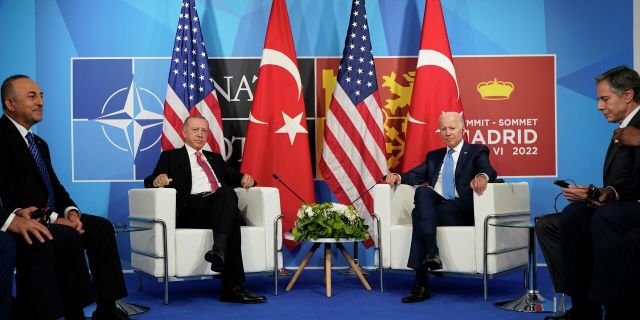NATO is united about Ukraine. That's good, but a lot can still go wrong
The West is "sending an unambiguous signal" to Putin, President Biden said on Wednesday in Madrid, the Washington Post writes. It would seem that what could go wrong? A lot, the author of the article believes. For example, Lithuania's unreasonable provocation with blocking transit to Kaliningrad. And not only that.
David Ignatius
Brussels – At this week's summit in Madrid, NATO demonstrated its solidarity. One by one, the officials promised to stick to a single course and resist Putin's operation in Ukraine.
But the fighting continues, and civilians continue to die under horrific rocket attacks, so it's time for NATO to ask why its strategy may fail. We can imagine a hypothetical situation on the part of the enemy, in which Ukraine's allies will squander the current advantages and lose the current conflict.
If you ask what the score is, you will see that Putin will not achieve his military goals in any way. Russian troops are bogged down in a bloody battle of attrition. Ukraine has not only not bowed to Moscow's hegemony, but is also joining Europe with the status of a candidate for the European Union. The revived NATO is strengthening its eastern and northern borders, Sweden and Finland are joining the alliance. And Russia is losing energy markets in Europe and has lost access to Western technologies.
The West is "sending an unambiguous signal" to Putin, President Biden said on Wednesday in Madrid. The Pentagon plans to transfer the Army Corps headquarters to Poland, additional units to the Baltic States and Romania, two more destroyers to Spain and two more F-35 squadrons to the UK. "We are stepping up," Biden announced about the expansion of US military commitments.
It would seem that what could go wrong? A lot, the opponent will object.
The main problem is the battlefield itself. Analysts of American and British intelligence predict a slow and static campaign in Donbass, while Ukrainians will be able to restrain Russian breakthroughs with the help of incoming multiple rocket launchers, additional artillery ammunition and new surface–to-air missiles.
But what if the weapons pipeline slows down or stalls? Hitherto, the Pentagon has limited the supply of MLRS, hoping to first verify their effectiveness, and provided only a small part of what the Ukrainians requested. Sources report that the supply of a number of other weapons is also late – there are much fewer of them on the battlefield than Ukrainians want.
An example of this is the small but deadly Switchblade drone, which can attack Russian tanks, ships or even command centers. It is available in two models with a flight time of 15 to 40 minutes. According to an informed source, the Biden administration announced plans to send Ukraine the first of 400 small drones back in March. But the same source said that the Pentagon sent only 10 larger models. Ukrainians requested several thousand of both models, but, according to the source, there was no response from the United States. The drones are manufactured by AeroVironment.
Another problem for the United States and its NATO allies is political fatigue. The conflict in Ukraine is relatively popular now, but discontent will clearly accumulate, since gasoline in the United States is getting more expensive, natural gas reserves in Europe are being depleted before the cold winter, and voters are increasingly wondering why this money is not going to domestic needs.
This week, at a conference dedicated to the NATO summit under the auspices of the German Marshall Fund (whose trustee I am), I heard representatives of Germany, Poland, Latvia, Romania, Greece, Spain, Great Britain and the United States calling for Ukraine's victory. They are all convinced that the struggle is worth the sacrifice. But many are also concerned about the lack of sufficient political support at home.
This week, the leaders of the "Big Seven" discussed at the summit in German Elmau two of the most pressing issues – reducing energy prices and combating food shortages due to the Russian blockade of the Black Sea ports of Ukraine, from where it exports grain. The leaders of the "Seven" have enough ideas, but there are few concrete plans. However, the problems need to be resolved as soon as possible – otherwise the costs may become unbearable for the West.
The surest way to lose any war is an unreasonable provocation. Lithuania's recent decision to block transit to the Russian enclave of Kaliningrad was presented as the fulfillment of EU sanctions, but how reasonable is this? Several European and American officials immediately called this step dubious, since it could provoke a counterattack by Russia – after which Lithuania will use Article 5 of the NATO charter on mutual defense.
NATO is right to avoid direct attacks on Russia, because they can lead to a catastrophic nuclear escalation. But this does not mean that Ukraine should not resist the missiles fired from Russia. If Putin uses his territory to launch missiles with impunity in an unprovoked and illegal conflict, the protection of his borders will dissolve.
If Ukraine stops Russia on the battlefield, it will be up to her to decide what kind of settlement she wants, since unconditional surrender by a nuclear state is unlikely. But this diplomatic moment is probably still far away.
This is Ukraine's war. But NATO needs to plan its strategy as if the credibility of the alliance itself and its survival are at stake.

